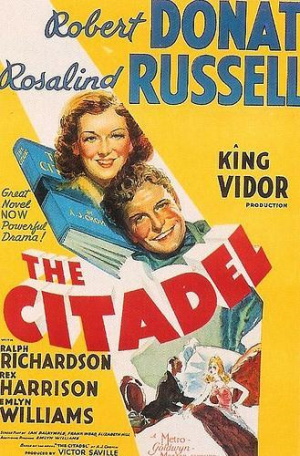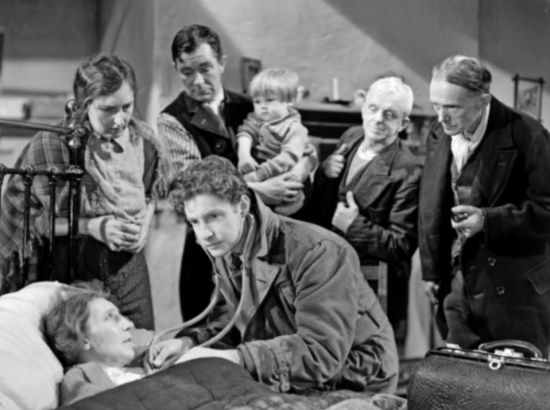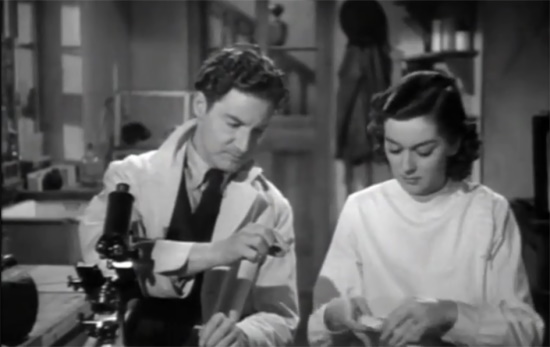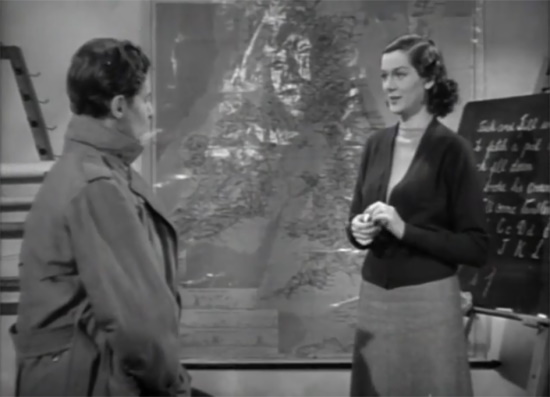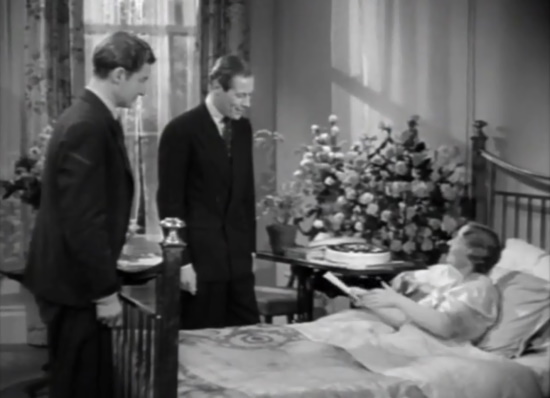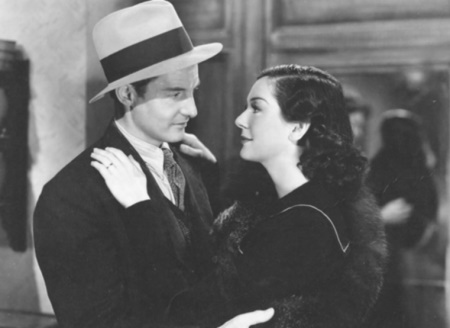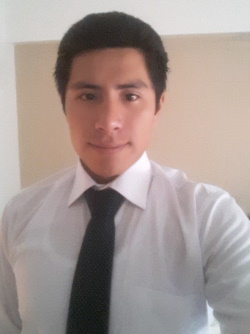Meu SciELO
Serviços Personalizados
Journal
Artigo
Indicadores
-
 Citado por SciELO
Citado por SciELO -
 Acessos
Acessos
Links relacionados
-
 Citado por Google
Citado por Google -
 Similares em
SciELO
Similares em
SciELO -
 Similares em Google
Similares em Google
Compartilhar
Revista de Medicina y Cine
versão On-line ISSN 1885-5210
Rev Med Cine vol.17 no.1 Salamanca Jan./Mar. 2021 Epub 29-Mar-2021
https://dx.doi.org/10.14201/rmc20201711724
ORIGINALS
The Citadel (1938) by King Vidor: lights and shadows in the practice of professionalism
1Facultad de Medicina Humana. Universidad Privada Norbert Wiener (Perú)
The Citadel (1938) by King Vidor, is a film that narrates the professional life of Dr. Andrew Manson, from his enthusiastic start as a recently graduated doctor in a mining town in Wales, where he works passionately in different cases regardless of the circumstances, until his arrival in London where he sees his purpose distorted as he enters the elite of the city. With the help of his wife Christine, he will try to regain the meaning of medicine. Throughout the film the thin line that divides the good exercise of professionalism is exhibited. For this reason, this paper reflects on medicine as a profession, its relationship with society, and highlights the importance of education in the humanities for strengthening ethical discernment in future health professionals.
Keywords: professionalism; medical ethics; doctor-patient relationship
Technical Details
Original title: The Citadel.
Country: United States.
Year: 1938.
Director: King Vidor.
Music: Louis Levy.
Photography: Harry Stradling Sr.
Film editor: Harry Gerstad.
Screenwriter: Charles Frend.
Cast: Robert Donat, Rosalind Russell, Ralph Richardson, Rex Harrison, Emlyn Williams, Penelope Dudley-Ward, Francis L. Sullivan, Mary Clare, Cecil Parker, Nora Swinburne, Edward Chapman,…
Color: Black and White.
Runtime: 110 minutes.
Genre: Drama, Medicine.
Language: English.
Production Companies: Metro-Goldwyn-Mayer (MGM).
Synopsis: «Andrew Manson, a young, enthusiastic doctor takes his first job in a Welsh mining town, and begins to wonder at the persistent cough many of the miners have. When his attempts to prove its cause are thwarted, he moves to London. His new practice does badly. But when a friend shows him how to make a lucrative practice from rich hypochondriacs, it will take a great shock to show him what the truth of being a doctor really is» (FilmAffinity).
Links:
https://www.imdb.com/title/tt0029995
Introduction
The meaning of medicine is based on vocation, and its integrity on service. In daily practice, health professionals, particularly doctors, must make valuable clinical judgments about which of the available options are best for a particular patient. For this, they are based on the four principles of bioethics: autonomy, beneficence, non-maleficence and justice1. This will lead physicians to provide consistent reasons in value judgments with which to inform their clinical decisions.
King Vidor's film The Citadel (1938) revolves around the professional practice of Dr. Andrew Manson (Robert Donat), who has recently graduated as a medical doctor from the fictional mining town of Blaenely in Wales. There he has the task of treating the miners, who mostly contract pneumonia caused by coal dust and silica. However, despite his noble scientific goals, he finds resistance in his research, by colleagues and the miners themselves.
Later, he moved to London where his purpose was frustrated when he entered a clinic where only the London elite were cared for, being the objective of this unethical entity to get all the money possible from the pockets of patients. With the help of his wife Christine (Rosalind Russell), he will try to return to the original path of the noble profession that is medicine.
In this article, it is proposed to reflect on medicine as a profession, its relationship with society through public health and occupational health. Likewise, some negative elements that are present in medical practice are highlighted and solutions are proposed through education so that they do not continue to occur.
Medicine as a profession
To understand medicine as a profession, one must first define the profession on its own, which is not an easy task. Etymologically it derives from the Latin professio, which refers to the action and effect of professing, be it a religious belief, a feeling, or a career; it is in this last one that we are going to focus. The profession is linked to the vocation component, since it implies a service to others and has the person as a base of vital interest. It also has a distinctive scientific knowledge base, which is constantly updated and determines its own standards. Finally, it has a special relationship with those it serves: clients, patients, etc. which inevitably makes it have particular principles based on ethics, being responsible to its users and to the profession itself2,3.
Doctors generally care for patients, diagnose, prescribe, and establish treatments. This aspect of clinical care plays an important role, since it constitutes the foundation of the doctor-patient relationship by establishing a bond of commitment and compassion for the patient, and it is solidified with the trust of the latter, provided that professionalism is correctly exercised. However, the work of doctors is not restricted to the clinical setting, or ideally should not be so, since the doctor also conducts research and is dedicated to teaching future health professionals. Likewise, physicians must have competencies and skills in resource management, as some not only care for patients but, in their more general scope, families or even entire communities. Thus, resource management is not only limited in terms of financing, but also in the appropriate use of available time, skills, and facilities. Resources have always been and will continue to be finite4. Faced with this, the doctor is constantly trying to solve the classic dilemma of how to do what is best for one patient without harming another.
The representative features mentioned above are reflected at the beginning of the film in the protagonist, Dr. Manson, who recently graduated from the career, is excited to start attending different cases, he does not care about the time of day or the distance of the cases which he must attend. At midnight he promptly came to the call of a case of an older woman with suspected typhoid fever (Photo 1) or when he comes to attend deliveries in distant places of the town.
Another clear example of that impetus that should characterize doctors, occurs when, not having an adequate environment to be able to further analyze the samples of their patients, he implements a laboratory in his house with his wife in order to Investigate sputum samples from miners with pneumonia (probably tuberculosis, according to him), in addition to samples of coal dust and silica (Photo 2)
Medicine and society
It is impossible to affirm that the medicine that was practiced a century ago is the same one that is practiced today, since the precipitous development of biomedical technology, with increasingly admirable discoveries and inventions, has caused that medicine has continuously changed over time throughout history5. This has led to reflection on medical practice. It is a fact that medicine cannot exist individually and that is why it must be in relation to society, since it is the latter that it serves6. So, faced with this panorama, is it necessary for medicine to continually redefine itself according to social needs?
Medicine plays an important role not only in the individual, but in society. And without the latter, medicine cannot advance; because doctors are agents of social change. Already since the 19th century, in Germany, emphasis had been placed on this aspect with the ideas of Virchow, who affirmed that doctors are the advocates of the poor and social problems are not alien to them; or in the mid-1960s in England with McKeown and Lowe, who argued that social medicine seeks the study of medical needs in society and this in turn is closely correlated with epidemiology7,8. When mentioning the present, one should not exclude Evidence-Based Medicine (EBM) either, which consists of using the best available evidence and involves analyzing and comparing the use of scientific literature9.
In the film these concepts are embodied when Dr. Manson cares for a child with measles and the mother affirms that he had attended school during those days; therefore the doctor follows up to the school to check if there were any possible additional cases (Photo 3).
Likewise, EBM can be seen when a miner suffers a burn on his leg and Dr. Manson affirms that an antiseptic should be applied (as suggested by the latest studies of the time) to avoid any possible infection; in contrast, the town nurse, who has always attended these cases, affirms that it is enough to apply rosemary oil and let it rest, rebuking him for the aforementioned studies that nobody understands because they are in Latin.
The foregoing, both epidemiology and the triumph of evidence over experience (without underestimating the latter) lead us to speak of the following point.
Public health and occupational health, a close relationship
Public health in general terms refers to collective actions aimed at improving the health of the population; to this end, it promotes community efforts for the purpose of infection control in the community, sanitation of the environment, and the organization of health care services for early diagnosis. In other words, it promotes a culture of prevention by promoting education in people about the principles of personal hygiene and thus guaranteeing basic knowledge to develop good health practices. To achieve this purpose, epidemiology is not only an instrument but the basis of public health10.
On the other hand, occupational medicine is concerned with analyzing working conditions and their impact on the health of workers. Likewise, it emphasizes the prevention, diagnosis and treatment of diseases caused or exacerbated by working conditions; as well as the legal repercussions of this. Thus, occupational medicine comprehensively addresses the relationship between work and health, promoting the capacity and job performance of workers and ensuring their health11,12.
So, with what has already been said, there is a close relationship between occupational health and public health. While the first is limited to the workplace, the other watches over society in general, and work is a fundamental component in society. You can't talk about medicine without talking about society, and you can't talk about society without talking about work.
It cannot be affirmed in its entirety that the protagonist is an occupational doctor, since his work is not limited only to the attention of workers during their workday, but extends to the mining town where he is assigned. From this perspective, it fulfills more the role of a family doctor or even that of a health doctor. In the film it can be seen that Dr. Manson writes constant correspondence to the Department of Health requesting that the main well of the town be changed because it is evident that it is contaminated and therefore people get sick, but when they do not receive a response at the same time as more people contracted diseases, he decides, in an altruistic and at the same time vehement act, to destroy the well and thus a new one must necessarily be built.
Arrogance and medicine: a bad combination
While Dr. Manson tries to help his patients in the mine in an unorthodox way, he is faced with the refusal of not only different colleagues but even the same patients. The workers only want the symptoms to be treated but not the disease because they need their working day to live. A medical colleague (well advanced in age) tells him, «Don't try to tear down the walls of Babylon in one day,» referring to the proposed innovative methods.
The more knowledge, the more doubts, and sometimes more arrogance. Arrogance should not be confused with the paternalistic model of the doctorpatient relationship, which has been around for many centuries and is even still practiced by some doctors today. Regardless, the respect and prestige accorded to physicians can foster arrogance in some13. Today, the healthcare system has depersonalized the doctorpatient relationship and has intensified no longer a personal arrogance of the physician but an arrogance of the system, and this is a product of the patient not being seen as a person but as a disease to treat from which a profitability can be obtained.
It should not be affirmed that the conclusions reached in the absence of reliable facts are in themselves arrogant, even more so in medicine, where nothing is absolute, since it is a conclusion (diagnosis) given to a patient, a person. And as Osler would say: «The good physician treats the disease; the great physician treats the patient who has the disease.» Arrogance occurs when those who make various decisions, in the absence of adequate data, do not recognize or admit that uncertainty in their information. Good doctors are always aware of how little they know14. If this is the paradigm of the arrogance of experience, let us imagine what the lethality of the arrogance of ignorance, which is almost never mentioned, is like.
Money and medicine
With the rise of the private sector in the health system in recent decades, it could be intuited that the health care service is turning into a market where investments and economic gains prevail over the care offered to the patient. He who studies medicine simply to enrich himself will sooner or later discover that some other occupation can better satisfy that need, although that does not mean that doctors have to live a life of hardship and poverty.
Even so, accepting that health care can be a form of business, this opens the doors to another matter: the conflict of interests, from which doctors are not exempt from falling, either through pharmaceutical companies and private laboratories, research clinic, or else by saving the health entity's own resources. All this can alter the clinical decisions proposed by the doctor15,16.
Regardless of how the health system trend may be in the countries, the market cannot be allowed to determine who will receive medical care and treatment, since health (as a fundamental right) is above the economy; and therefore the market must not define the ethics of the medical profession.
In the film this is reflected when Dr. Manson migrates to London where he opens his office, initially persisting in his charitable spirit. As time progresses, through a colleague from the faculty, he introduces himself as a doctor to the London elite, who are mostly healthy people, but hypochondriacs. He works in an unethical clinic where doctors who claim to be specialists in different areas practice, when in reality they only cheat wealthy patients until they get the last coin. With the help of his wife, he will try to find the true purpose of medicine again (Photo 4 and Photo 5).
Education as a solution
The plot that the film transmits leads us to reflect on the practice of medicine by health professionals. For the above, there are components that make the doctor in his service work become distorted and in some way may lose the purpose of the meaning of medicine. And about those components, are they inherent in the situation? Or are they proper to the doctor who practices them (independent of the situation)? Or maybe it is both? Be that as it may, solutions must be emphasized to counter this. And as always go to the base of everything, medical education.
Medical training demands a special combination of skills and understanding. Fundamental pillars in this learning, apart from technical and practical knowledge, are the competences on ethics and humanity. These studies promote the development of moral discernment and critical judgment against different scenarios in patient care and attention. In itself it is the basis of the doctor-patient relationship since it solidifies the communication and trust between both agents17,18.
Likewise, another vital component in the training and life of the doctor is empathy, which unfortunately the current trend suggests that this attribute is being lost. Consequently, the humanities subjects should be promoted and strengthened in the curricula of all careers in health sciences, among those subjects: Bioethics, History of medicine, Art and medicine, Anthropology, Philosophy, among others.
Conclusion
We often think that the extraordinary is something impossible to achieve, but sometimes the constancy of what we consider «ordinary» is what makes it extraordinary and seen in this way, it is not impossible to achieve. Fulfilling our duties with perseverance leads to a life of excellence, worthy of being a role model. Experience, sometimes, leads us to express what we have learned in order to expose it to society, as in this film based on the novel by A.J. Cronin, whose profession before being a novelist was that of a doctor, and precisely began his practices in a mining town. It is probable that the sense of the film was to lead to a reflection regarding some negative elements that occur during the practice of medicine; facts that can be developed in any medium, from the darkest environments of the condition of humanity exposing the almost impossible survival of morality. That malpractice is denounced through the professional life of the protagonist. As happened with Dr. Manson, it shows us the thin line that divides the good practice of professionalism; it is so difficult to reach the top and so easy to fall; but it is oneself who always establishes the end and you can always re-emerge or take the path wherever you are. Towards the end of the film, the path to humility and honesty is discerned being the best antidotes against pride; and for arrogance, the best antidote is doubt, which is why managing uncertainty is important in the practice of medicine. All these values should be cultivated as early as possible, incentivizing them from home, also in primary and secondary education; and strengthen it during university training, in all careers. In this way we will be laying the foundations for a culture of peace and tolerance not only in the professional sphere but in each of the aspects of life. I would like to end this article with the final lines of the film:
«Doctors have a duty to humanity. Let us not forget the words of the Hippocratic Oath: In any house I enter, I will always do it for the benefit of the sick person and I will flee from all premeditated errors and corruption».
Referencias
1 Siurana-Aparisi JC. Los principios de la bioética y el surgimiento de una bioética intercultural. Veritas. 2010; (22): 121-57. https://scielo.conicyt.cl/scielo.php?script=sci_arttext&pid=S0718-92732010000100006 [ Links ]
2 Saks M. Defining a profession: The role of knowledge and expertise. Professions and Professionalism. 2012; 2(1): 1-10. https://journals.oslomet.no/index.php/pp/article/view/151/355 [ Links ]
3 Nuñez-Cortés JM. Valores del médico para un ejercicio de calidad: el profesionalismo. FEM. 2014; 17(suppl 1): S23-5. http://scielo.isciii.es/pdf/fem/v17s1/estudio.pdf [ Links ]
4 Calman K. The profession of medicine. BMJ. 1994; 309(6962): 1140-43. http://scielo.isciii.es/pdf/fem/v17s1/estudio.pdf [ Links ]
5 Yadavendu VK, Kumar D. Bioethics, medicine and society – a philosophical inquiry. Curr Sci. 2009; 97(8): 1128-36 [ Links ]
6 Farrar J. Science, medicine, and society: A view from the Wellcome Trust. JAMA. 2015; 313(23): 2315-6 [ Links ]
7 Lee PR. The future of social medicine. J Urban Health. 1999; 76(2): 229-236. https://www.ncbi.nlm.nih.gov/pmc/articles/PMC3455984/pdf/11524_2006_Article_BF02344678.pdf [ Links ]
8 McKeown T, Lowe CR. An Introduction to Social Medicine. 1st ed. Oxford: Blackwell Scientific Publications; 1966 [ Links ]
9 Málaga-Rodríguez G, Sánchez-Mejía A. Medicina basada en la evidencia: Aportes a la práctica médica actual y dificultades para su implementación. Rev Med Hered. 2009; 20(2): 103-9 [ Links ]
10 Diderichsen F. Turning public health research into practice. Scand J Public Health. 2018; 46(22):3-4 [ Links ]
11 Raghav P. Strengthening occupational medicine to address challenges of occupational diseases: A priority. Indian J Public Health. 2017; 61(3): 153-4 [ Links ]
12 Smith DR, Guidotti TL. History of the Journal of Occupational and Environmental Medicine. J Occup Environ Med. 2016; 58(1): 1-2 [ Links ]
13 Berger AS. Arrogance among physicians. Acad Med. 2002; 77(2):145-7. https://journals.lww.com/academicmedicine/Fulltext/2002/02000/Arrogance_among_Physicians.10.aspx [ Links ]
14 Ingelfinger FJ. Arrogance. N Engl J Med. 1980; 303(26): 1507-11 [ Links ]
15 Muula AS. Medicine and money: Friends or foe? Mens Sana Monogr. 2006; 4(1): 78-88 [ Links ]
16 Keshavjee S. Medicine and money: the ethical transformation of medical practice. Med Educ. 2004; 38(3): 271-5 [ Links ]
17 Doukas DJ, McCullough LB, Wear S. Perspective: Medical education in medical ethics and humanities as the foundation for developing medical professionalism. Acad Med. 2012; 87(3): 334-41 [ Links ]
18 Mendoza A. La relación médico paciente: consideraciones bioéticas. Rev Peru Ginecol Obstet. 2017; 63(4): 555-64. http://www.scielo.org.pe/scielo.php?script=sci_arttext&pid=S2304-51322017000400007 [ Links ]
Received: March 23, 2020; Accepted: April 14, 2020; pub: February 17, 2021
 Licencia CC BY-NC-ND.Licencia Creative Commons Atribución-NoComercial-SinDerivar 4.0 Internacional
Licencia CC BY-NC-ND.Licencia Creative Commons Atribución-NoComercial-SinDerivar 4.0 Internacional











 texto em
texto em 

